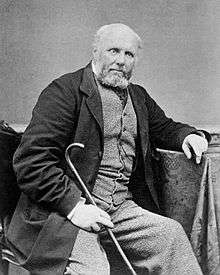Alfred Domett
Alfred Domett CMG (20 May 1811 – 2 November 1887) was an English colonial statesman and poet. He was New Zealand's fourth Premier.
Alfred Domett CMG | |
|---|---|
 | |
| 4th Premier of New Zealand | |
| In office 6 August 1862 – 30 October 1863 | |
| Monarch | Victoria |
| Governor | George Grey |
| Preceded by | William Fox |
| Succeeded by | Frederick Whitaker |
| Personal details | |
| Born | 20 May 1811 Camberwell, Surrey, England |
| Died | 2 November 1887 (aged 76) London, England |
| Political party | None |
| Spouse(s) | Mary George ( m. 1856) |
| Children | 1 son[1] |
| Father | Nathaniel Domett |
| Signature | |
Early life
Domett was born at Camberwell Grove, Surrey; the fourth son of Nathaniel Domett,[2] a ship-owner. He entered St John's College, Cambridge,[3] but left the university in 1833.[4] He entered at the Middle Temple, 7 November 1835, and was called to the bar on 19 November 1841.[2]
Poetry
Domett published one or two volumes of poetry from 1833, and contributed several poems to Blackwood's Magazine, one of which, A Christmas Hymn, attracted attention. He was called to the bar, but for ten years he lived a life of ease in London, where he became the intimate friend of Robert Browning, of whose poem Waring he was the subject. 'How much I loved him, I find out now I've lost him'. In the poem Browning asks what has become of his friend, but is sure he will gain some fame in far-off lands:
...so I saw the last Of Waring! ... Oh, never star Was lost here but it rose afar!
An account of the friendship between the two men appeared in The Contemporary Review for January 1905, by W. H. Griffin.[4] Thereafter, with the approval of Browning's son, Frederick G. Kenyon edited correspondence between and relating to Browning and Domett, after the 1904 auction purchase of the letters by Reginald Smith, head of publishing firm Smith Elder and Co.[5]
Among his books of poetry, Ranolf and Amohia, a South Sea Day Dream (1872), about Māori life, is the best known, and Flotsam and Jetsam (1877) is dedicated to Browning.[4] He continued to write poetry all his life, in the style of rhyming panegyrics such as An Invitation, with its allusions to the sub-tropical flora and threatened inhabitants of countries such as New Zealand:
And if weary of mists you will roam undisdaining To a land where the fanciful fountains are raining Swift brilliants of boiling and beautiful spray In the violet splendour of skies that illume Such a wealth of green ferns and rare crimson tree-bloom; Where a people primeval is vanishing fast, With its faiths and its fables and ways of the past: O with reason and fancy unfettered and fearless, Come plunge with us deep into regions of Day—Come away—and away! --
Decadent poet Ernest Dowson was his great-nephew.
New Zealand politics
| New Zealand Parliament | ||||
| Years | Term | Electorate | Party | |
| 1855–1860 | 2nd | Town of Nelson | Independent | |
| 1860–1866 | 3rd | City of Nelson | Independent | |
In 1842 Domett emigrated to New Zealand, where he filled many important administrative posts, being Colonial Secretary for New Munster Province in 1848,[6] secretary for the colony in 1851, and the fourth Premier of New Zealand from 1862 to 1863.[4][7] He represented the electorate of Nelson, first as the Town of Nelson 1855–1860 and then City of Nelson 1860–1866 (retired).[8] Unusually, as electorates at this time returned multiple members, Domett shared representation of Nelson with Edward Stafford, who had also served as Premier.
The most noteworthy change Domett brought about during his tenure in office was the moving of New Zealand's capital from Auckland to Wellington in 1865. In November 1863 he moved a resolution before Parliament that "it has become necessary that the seat of government... should be transferred to some suitable locality in Cook Strait."[9] He returned to England in 1871 and became a CMG in 1880.[4]
Domett was a member of the New Zealand Legislative Council from 19 June 1866 until 3 July 1874, when his membership lapsed through absence.[10]
Notes
- Graham, Jeanine. "Domett, Alfred". Dictionary of New Zealand Biography. Ministry for Culture and Heritage. Retrieved 15 September 2013.
- Mennell, Philip (1892). . The Dictionary of Australasian Biography. London: Hutchinson & Co – via Wikisource.
- "Domett, Alfred (DMT829A)". A Cambridge Alumni Database. University of Cambridge.
-

- Robert Browning and Alfred Domett, edited by Frederic G. Kenyon, 1906, Preface, pp v, vi
- Scholefield 1950, p. 18.
- Scholefield 1950, p. 30.
- Scholefield 1950, p. 104.
- Phillip Temple: Wellington Yesterday
- Scholefield 1950, p. 76.
References
- Scholefield, Guy (1950) [First ed. published 1913]. New Zealand Parliamentary Record, 1840–1949 (3rd ed.). Wellington: Govt. Printer.CS1 maint: ref=harv (link)
External links
| Wikimedia Commons has media related to Alfred Domett. |
| Wikiquote has quotations related to: Alfred Domett |
| Wikisource has original works written by or about: Alfred Domett |
- Engraving from a water colour by G. Lance of Domett when a law student (1836)
- Photograph of Domett in his later years by Herman John Schmidt
- Works by or about Alfred Domett at Internet Archive
- Works by Alfred Domett at LibriVox (public domain audiobooks)

- Cartoon of un-named drunk MP by Alfred Domett, 1856
- Online reproduction of above-referenced correspondence between Domett and Browning, published in 1906, edited by Frederick G. Kenyon
| Government offices | ||
|---|---|---|
| Preceded by Edward Stafford |
Premier of New Zealand 1862–1863 |
Succeeded by Frederick Whitaker |
| New Zealand Parliament | ||
| Preceded by James Mackay Samuel Stephens |
Member of Parliament for Nelson 1855–1866 Served alongside: Edward Stafford |
Succeeded by Oswald Curtis |